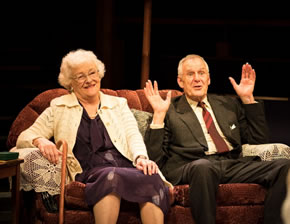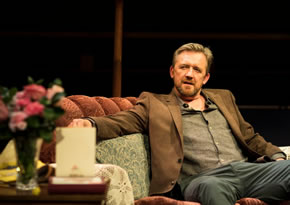The March On Russia - at the Orange Tree Theatre, Richmond
This David Storey revival doesn't live up to expectations says our reviewer
This revival of David Storey's play about family life across the generations starts out as a gentle comedy and turns into something rather unpleasant.
It's 1989, Tom Pasmore and his wife are about to celebrate their 60th wedding anniversary with their three children who descend on them out of the blue. But don't get this wrong, it's not a cosy tale of a family party, it's a story of festering dislikes, disappointments, bitterness and a total lack of empathy. To be fair, it's not all grim there are some tender, touching moments, but they get swamped by the unrelenting negativity.

Ian Gelder and Sue Wallace (images Helen Maybanks)
The Pasmores live in a bungalow somewhere in Yorkshire. The tiny Orange Tree Stage works well here, encapsulating the claustrophobia felt by two people who don't get out much.
The set is cleverly divided into two parts; there's a kitchen with a real kettle, which is a good thing as they drink an awful lot of tea, and the sitting room which has armchairs and a real coal fire.
Tom (Ian Gelder) is a likable enough character, a bit on the senile side, but not totally daft even if he does see himself as a bit of a ladies' man. His attempts at flirting with the younger next door neighbour is just one of the many things about him that irritate his wife (Sue Wallace) and by golly, there are many, many things. Their lives seem to have degenerated into a constant battle to score points whether it's getting answers to the crossword, the best way to do the toast or ill health. Bickering and sniping have replaced conversation.
With a less than idyllic present and nothing to look forward to, their memories loom large. Tom's glory days were when he joined the march on Russia 1919. His wife, a bitter and spiteful woman only remembers bringing up three children in a one roomed apartment when all the washing had to be done by hand and dried indoors when it was raining. The offer of a council house was gratefully received, but that has never stopped her voting Tory, and missing the irony when she spouts Thatcherite rhetoric about scroungers.

The children are Colin (Colin Tierney) a successful writer and lecturer who's had a crisis of confidence after his last book was poorly reviewed; Wendy (Sarah Belcher), a local councillor, childless and soon to be divorced from her cheating husband, and Eileen (Connie Walker), the only one who seems to meet with her mothers' approval. Eileen's a stay at home mum married to a teacher who's never going to be headmaster. She hasn't been given the depth of the other two so we don't get know to if the constant smile and jolliness are concealing anything. The three of them never really got on as children and nothing's changed, adding another layer to the bickering.
There are some nice directorial touches as when they decide to go for a drive and have lunch out somewhere, Tom pretends to not like wearing a suit but he struts proud as a peacock when he's got it on, and his wife, so excited to be going out changes into her best frock, combs her hair, dons earrings and lipstick and takes her best handbag. It's after lunch when they've had a few drinks that things don't improve and more gets said until a worrying secret is revealed.
In spite of all its good points - the overall production is terrific - there's something unsatisfactory about it, it doesn't go anywhere. It's a long play and with no attempt to analyse or rectify the situation it gets wearing. David Storey wrote this as part of a trilogy and perhaps it needs to be seen in that context - I don't know. I'm just sorry to say that I went with high expectations and came away disappointed.
Penny Flood
The March on Russia runs until 7 October 2017.
September 24, 2017